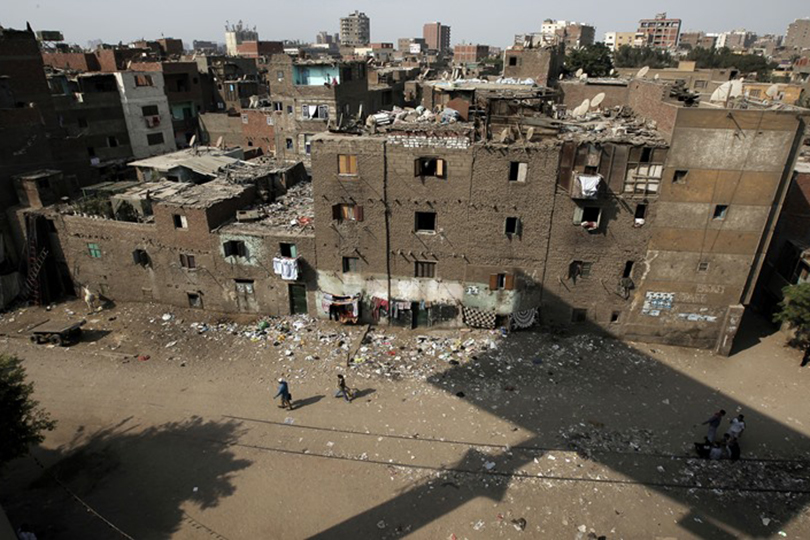A regular survey of experts on matters relating to Middle Eastern and North African politics and security.
Researcher in the Economic and Social Justice Unit at the Egyptian Initiative for Personal Rights
This phenomenon of rising poverty amid high growth is reminiscent of the situation just before the uprising in 2011, when Egypt had witnessed historical levels of growth concurrent with rapidly increasing levels of impoverishment. The continuation of the “increasing wealth amid increasing poverty” trend only means that now the economy is larger and poverty is more acute than was the case on the eve of January 25, 2011.
This does not necessarily mean that another uprising is imminent, not least because there are endless other variables that could affect the unfolding of events. However, what is certain is that this trend is politically, socially, and economically unsustainable. The adoption of progressive economic measures is no longer merely a nice ideal, it is a necessary practicality to prevent the full disintegration of the current situation. It is also necessary for the survival of the tens of millions of Egyptians who continue to live in extreme deprivation, and the additional millions who slip into poverty every year.
Beesan Kassab | Egyptian journalist who specializes in economic issues
The recent figures released by Egypt’s official Central Agency for Public Mobilization and Statistics show that poverty reached 32.5 percent in 2019, from 27.8 percent in 2015, while extreme poverty reached 6.2 percent from 5.3 percent for the same time periods. Poverty is defined as the inability to meet essential needs such as healthcare and education, while extreme poverty is defined as the inability to meet one’s nutritional requirements. It’s not easy to predict the consequences of rising poverty, particularly protests, given the government’s tight security measures. However, the figures will push Egyptians to question the government’s reform program, given that the percentage increase in poverty this time is the highest that it has been in eighteen years. It was ironic in this context to see the minister of planning admitting that it was normal for poverty to rise as a result of the government’s reform program.
Amr Adly | Assistant professor in the Department of Political Science at the American University in Cairo, author of Cleft Capitalism: The Social Origins of Failed Market Making in Egypt (Stanford University Press, upcoming).
It’s official at last. Poverty is on the rise in Egypt despite apparent signs of economic recovery. The increase in poverty rates could be traced to successive rounds of austerity and devaluation of the Egyptian pound that the current regime has undertaken since late 2016 under the auspices of the International Monetary Fund. What political implications might this have? There isn’t an easy or straightforward answer as there isn’t a mechanical or linear relationship between politics and economics.
The regime has managed to successfully use its repressive capacities to pass unpopular measures that were deemed necessary to address and fix Egypt’s financial problems. However, the brunt of this stabilization process has been borne by the broad base of poor and middle class Egyptians. The reforms have paid off, but not for the many. Macroeconomic indicators have improved, helping to secure external loans that have helped to drive economic recovery. The recent figures released by the Central Agency for Public Mobilization and Statistics show that poverty has risen to 32.5 percent in 2019 from 27.8 percent in 2015. It shows that the Egyptian authorities can push through unpopular economic measures and not suffer major consequences. This is a message to foreign lenders that Egypt’s debt-driven recovery is sustainable, at least in the foreseeable future.
Sherif Mohyeldeen | Nonresident scholar at the Carnegie Middle East Center in Beirut
The fact that this shocking figure was published by a governmental agency, the Central Agency for Public Mobilization and Statistics, is a clear sign from within the government that its economic development policies are not succeeding well in fighting poverty.
The figures affirm that a third of Egyptians either continue to be poor or became poor more recently, without much hope that they will emerge from this situation anytime soon. The reason for this is that the policies that led to the rise in the poverty rate are ongoing and are unlikely to change. This comes on top of a more general feeling in Egypt that the regime and the military, who have taken on a range of economic activities, are responsible for this deteriorating situation. Such a feeling is going to be deepened as a consequence of the poverty figures, which will likely lead to increasing emigration not just for political reasons but for economic reasons as well.







Comments